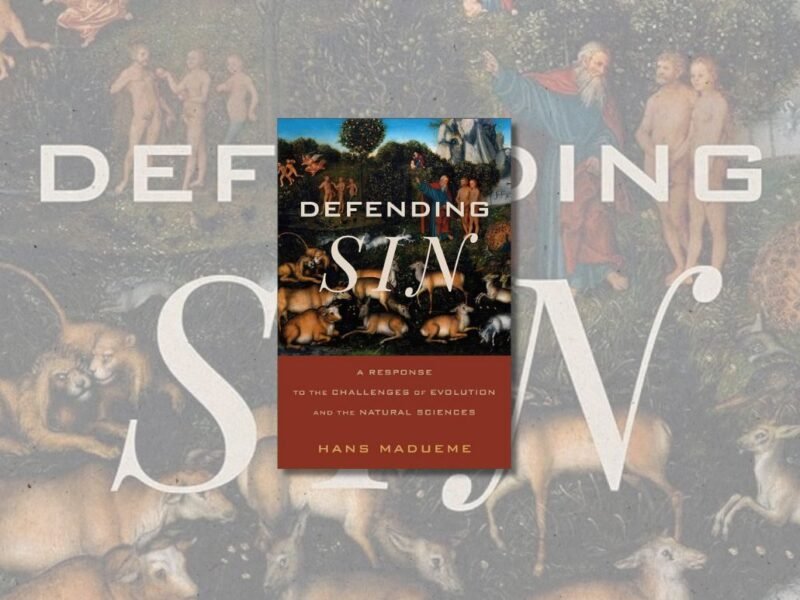Confronting Injustice without Compromising Truth: 12 Questions Christians Should Ask About Social Justice. By Thaddeus J. Williams. Grand Rapids: Zondervan Academic, 2020. 288 pp. $22.99 (paper).
“I can’t do it,” I told the couple sitting in front of me. It was the summer of 2020. The COVID pandemic was continuing to build, the presidential campaign season was ramping up, and the national conversation (especially online) was laser-focused on issues of race in the wake of the death of George Floyd while in police custody. The organization, Black Lives Matter, had risen in prominence and influence. This couple were concerned and seemed more than a little annoyed that I had not embraced that organization, marched with them, and led our local church to do so as well. So, as we sipped hot tea at their kitchen table, I listened. I empathized as much as possible with their concerns, many of which I admitted I shared. But at the end of the day, it did not matter that I had addressed racism directly from the pulpit. It didn’t matter that I had written about race on my blog or even that I had always been an advocate of fair and equal treatment. All that mattered was that I was not willing to embrace the BLM organization. But I had researched the organization. I studied their website and their core values. As a Christian, and as a priest, I did not believe it to be an organization I could endorse in good conscience. Furthermore, I didn’t believe their penchant for destroying black communities and businesses by rioting and looting was, in any way, going to make a positive contribution to eradicating racism.
The more we talked, it was clear there was something deeper happening. A more foundational divide was emerging. As I watched conversations online (even among fellow clergy in our own denomination) I sensed our deep concern for these issues was causing some to inadvertently embrace non-Christian values and narratives. It became evident to me that this divide was not just a result of differing opinions on modern concerns of justice (of which racism is only one in a litany of issues). There was a chasm emerging that revealed divergent philosophical and theological approaches to defining the issues as well as how to handle them. I don’t deny the many issues facing our church and our world that broadly fall under the heading of “justice issues.” But what I have seen lacking is a serious effort to define the issues accurately and to deal with them biblically.
This is why Thaddeus Williams’ new book, Confronting Justice without Compromising Truth, is so needed today. Williams holds a Ph.D from Universiteit, Amsterdam and is assistant professor of Systematic Theology for Talbot School of Theology. He has also taught philosophy, literature, and jurisprudence in addition to being a lecturer for L’Abri Fellowship. He is no pundit or pop evangelist and his book shows it. Williams’ work is well-researched and supported, and, while having a strong academic nature, it is highly readable.
Williams opens by affirming the Christian’s call to be engaged in issues of justice and yet wise in how we do so. He says, “‘Seek justice’ is a clarion call in scripture, and those who plug their ears to that call are simply not living by the Book. But the Bible’s call to seek justice is not a call to superficial, knee-jerk activism. We aren’t commanded to merely execute justice, but to ‘truly execute justice.’” As his admonition presupposes, “There are untrue ways to execute justice, ways of trying to make the world a better place that aren’t in sync with reality and end up unleashing more havoc in the universe. We can’t separate the Bible’s commands to do justice from its commands to be discerning” (3).
The major way he unpacks this discernment is by closely examining the current, popular notion of “Social Justice,” which he calls “Social Justice B,” and offering an alternative, more biblically rooted option, “Social Justice A.” In his words, “Not everything branded social justice is social justice” (5). Through the next twelve chapters of his book, he tackles a number of pertinent topics that help us discern, as well as engage in, authentic biblical justice. Early on, he discusses how belief in God and the concept of the Imago Dei (the image of God present in all of humanity) should undergird our discernment. Our quest for justice begins by understanding the people whom we long to help, and that even the people who disagree with us, who sit on opposite sides of the aisle, are bearers of the image of God. This provides a grounding for discussing equality, dignity, and value.
He then examines such topics as group identity, divisiveness, and disparity. Williams looks at our modern idols (on both the left and the right) that can lead us astray—idols such as the self, the state, or social acceptance. He calls upon us to exercise discernment by examining facts, not simply stories designed to evoke anger and divisiveness. Williams also examines modern tribalism and propaganda. He says, “Telling lopsided stories to paint damnable pictures of entire people groups—whether that group happens to be black, brown, white, male, female, or whatever—is also a sin we must take to the cross. In biblical terms, it is a form of bearing false witness, a form of slander, a form of not loving our neighbors” (56).
Such narratives lead to “scapegoating,” which is particularly dangerous as it moves us quickly to the dehumanization of our neighbors. If our theodicy (the theology of accounting for evil in the universe) is rooted in blaming one group—as the Nazis blamed the Jews, or as Marx blamed the capitalists—we are one step away from a violent revolution and very far away from true justice: “If the body count of the last century has taught us anything, it is that ideas have consequences and bad ideas have bad consequences. Telling damnable stories about entire people groups, seeing individuals as exemplars of their groups and blaming the hardness of life on them are really bad ideas. They should be given no foothold in the Church of Jesus Christ” (60).
One of the key “bad ideas” Williams addresses is Social Justice B’s perspective on systemic injustice. He centers his discussion on the question, “Does disparity in outcome automatically provide proof of systemic oppression?” When Social Justice B proponents see unequal outcomes, it is interpreted as evidence of racist or sexist (or…) systems. Their answer, as we have seen promoted throughout the last year, is to overthrow the system. But is there another way of looking at these unequal outcomes that might provide more accurate insight as to why they exist?
Williams says “Yes.” The way to examine such claims is to look at specific facts related to specific instances. The notion of painting the “systemic” onto a problem ignores many other factors that can lead to unequal outcomes. According to Williams, the “systemic” charge is an easy but inaccurate route. Outcomes have factors beyond race, gender, sexual orientation, etc. Outcomes are the result of priorities and choices made by individuals resulting from everything to upbringing to location to age.
One example he gives of disparate outcomes is the percentage of Asian and Jewish students at Ivy League schools. From 2007 to 2011 Asians made up 16% of the student population. Jewish students made up 23%. But in the U.S population they make up 5.6% and 1.4%, respectively. Williams says, “In other words they’re overrepresented by factors of 3 and 16. Does this prove that the Ivy League is riddled with Asian and Jewish supremacy? Of course not” (85).
He sums up his point well when he says, “The more fully committed we become to a vision of justice in which unequal outcomes are automatically assumed to be the result of injustice, the more our quest for justice will lead, indeed it must lead, to the use of power to enforce sameness.” He continues, “Different outcomes are the price of freedom. The converse is also true. Tyranny is the price of equal outcomes” (86–87).
One very important discussion he encourages is the examination of the unfalsifiable conclusion. He defines this as a perspective that, when held, “no amount of logic, evidence, experience, or Scripture [can] possibly change our outlook” (151). In Williams’ opinion this is one of the key methods Social Justice B supporters use to silence any questions about their claims. For instance, if you disagree with a Social Justice B person, you may well be accused of hate, bigotry, phobia, white supremacy, or white fragility. Williams quotes one activist who says we must “accept the grievances of faculty of color without question.” The activist continues, “We are inflicting harm by asking for evidence…to ask for evidence of racism is racism with a capital R” (153). This is a prime, and well-used, unfalsifiable argument.
Williams comments on this, saying, “Writing off someone’s viewpoint because of their melanin levels makes us actual racists” (155). Additionally, Williams sees this among theologians, and I believe we have seen this in recent years within Anglicanism. Quoting Anthony Evans, he says, “There are some black theologians who seek to make their frame of reference purely the black experience, but this assumes the black experience is absolutely moral and absolutely just, and that is not the case” (157–58). No experience rises to the level of infallibility. Unfalsifiable arguments that declare guilt on entire people groups, that refuse to be examined for truthfulness, are inherently Marxist. On this point, we really need to read more Solzhenitsyn.
The goal of objectivity in the pursuit of justice is truth. Only when we know the actual truth about a given injustice can we begin to examine authentic and equally true ways of dealing with it. When ideology and tribal thinking dominate the narrative and discussion, it becomes virtually impossible to have meaningful conversation. And in these difficult days we need to have courageous and difficult conversations. Sexism, racism, bigotry and “isms” of all sorts do exist. Williams does not deny this, nor do I. But it is critically important that the church deal with these things from a truly biblical and Christian worldview. If we adopt these other methods, such as the “Social Justice B” narrative, we may well be party to a much deeper injustice than we realize. Ideologies are poor masters.
As Christians, we should care deeply about justice. It is a call of God on our lives and a tenet of the “Good News” we proclaim. We should be active in our pursuit of biblical justice and speak into the situations faced in our troubled, sin-filled world. I firmly believe that what Dr. Williams has given us is a great gift, a clear call to the pursuit of justice and a means to protect the church from modern social justice eccentricities. Instead of being divided due to the importing of socialist or Marxist thought and trying to baptize it in the church, there is a way for us to unite around an authentic justice rooted in the scriptures and the Kingdom of God.
Williams articulates my concern as I sat in that kitchen this past summer, and my concern regarding some of the current discussions in the church: “If we don’t ponder these differences (authentic Christian justice vs. that which isn’t), the church will find itself bowing down to a trendy ideology rather than to Jesus as Lord” (77).
The Very Rev. Chris Findley
Smyrna, TN






'Book Review: “Confronting Injustice without Compromising Truth”' has no comments
Be the first to comment this post!